Philip Buckland is an associate professor of environmental archaeology at the Department of Historical, Philosophical and Religious Studies at Umeå University, Sweden. With a PhD in environmental archaeology (2007), he is director of the Environmental Archaeology Lab infrastructure for research, consultancy and methods development. His research includes long-term changes in climate and environment, human impact on the landscape, and the interpretation of archaeological sites using fossil insect remains. He continues to maintain and develop the Bugs Coleaopteran Ecology Package, a research and teaching system for palaeoecology and ecology which has been active since the mid 1980s, and received an honourable mention at the 2015 international data rescue awards in the geosciences. Phil is also active in the Scandinavian archaeological consultancy sector and maintains cross-sector links with Swedish government administrations involved in cultural heritage impacts and management. Phil is director of the Strategic Environmental Archaeology Database, a research data infrastructure for studying a broad range of aspects of past environments. The database includes data ranging from the individual counts of plant macrofossils from archaeological samples and geochemical measurements of soils, sediments and ceramics to modern ecological and climate reference data. He is also a member of the leadership council for the Neotoma Paleoecology Database and Community, and a partner in the Swedish Lifewatch Consortium for biodiversity studies. Phil is involved in the development, application and study of these and other digital infrastructures, with a particular focus on linking ecology and biodiversity research to the humanities. Phil is a Co-PI of the NSF funded DataARC, a massively interdisciplinary project developing tools to link datasets from archaeology, paleoecology, climate science, history, and literature. He teaches a number of courses in archaeological theory and methods, including GIS and supervision at undergraduate and postgraduate levels.

Philip Buckland
Circumpolar Observatory
Related Affiliates
Please select listing to show.